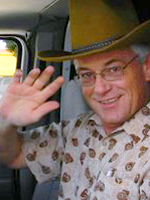Thoughts on last week's impeachment
By Leon WordenWednesday, December 23, 1998
| N |
The NCWD board voted 4-1 to ask Kotch to step down from his position as their representative on the Castaic Lake Water Agency board. The lone dissenting vote came from Kotch, who wants to stay.
CLWA is the Santa Clarita Valley's wholesaler of state water. It sells water from Northern California to the valley's four water retailers, one of which is NCWD. Seven members of CLWA's 11-member board are elected by the public. The other four are nominated by the four retailers as proscribed under a special state law.
Last week's vote has sparked a flurry of legalistic debate. The bottom line — one of the bottom lines — is that neither NCWD nor CLWA can force Kotch to resign. Once a water retailer has nominated someone to fill its seat on the CLWA board, CLWA appoints that person to a four-year term. By law, the only way he can be forcibly removed is if he commits a crime, leaves the area or dies.
Thus it is the individual who is appointed, not the "water company representative." Once appointed, it's up to the individual whether he wants to represent the water company that asked him to be there in the first place.
Common sense and decency — but not the law — dictate that someone who is appointed to represent a water company should step down if asked. That's what happened in 1995, when Don Hayes was defeated by Kotch and Dick Unger in an NCWD election.
At that time, NCWD was in the awkward position of having its CLWA appointee, Hayes, no longer serving on the NCWD board. A couple of weeks of debate led to Hayes voluntarily vacating his CLWA seat. Kotch was appointed to the unexpired term.
Hoping to close this strange loophole, in January 1996 NCWD passed a resolution stating that its CLWA nominee "shall serve at the pleasure of the board of directors of the NCWD" and that "the district's nominee shall be expected to submit his or her resignation ... if, by majority vote, the (NCWD board) requests the nominee to do so or if the district's nominee ceases to be a member of the (NCWD board)."
Mike Kotch seconded the motion and voted for the resolution.
It didn't have the force of law — again, NCWD can't remove its own CLWA representative — but it clearly expresses the board's intent. The four NCWD board members who asked Kotch to resign say Kotch should abide by his own vote. Kotch disagrees.
"My reasons for voting on this resolution were that it codified that any nominee would be (an NCWD) board member, and if the board member no longer served on NCWD, a contract would require that person to resign from CLWA," Kotch said Monday. "I did not intend this resolution to be a tool that the NCWD could use to change an appointed director ... on a whimsical or ad-hoc basis, or even with major changes in board structure and philosophies."
Board member Val Thomas said the change wasn't made on a whim; rather, it was a yearly organizational meeting item, and Kotch knew it was coming.
Kotch says the resolution shouldn't apply to him anyway because he was appointed to CLWA a month before the resolution passed. "There was no retroactive clause," he said.
The other board members say this argument is bogus because Kotch started a new CLWA term in January 1997, a year after the resolution passed. Even if it didn't apply to him in 1996, they say, in applies to him now.
The NCWD majority says it asked Kotch to resign from CLWA because he missed 19 of 33 CLWA meetings in the last year. Kotch says he missed meetings because CLWA and NCWD meetings were scheduled at the same time. However, attendance records show only one or two meeting conflicts.
Kotch says several people spoke in his favor last week. However, the only people who regularly attend NCWD meetings are SCOPE members and their friends. The speakers were Lynne Plambeck, Phil Hof, Ed and Joan Dunn, Marsha McLean, Bob Lathrop and Vera Johnson.
Kotch says the "real" issue is politics, a matter of different philosophies over growth. The rest of the board says it's not. Certainly, board members Tom Campbell, Val Thomas and Barbara Dore don't believe in using water to control growth. But Kotch's allegation doesn't explain the fourth vote.
"I have great respect for Mike," board member Dick Unger said Monday. "I just don't like to depend on members of the audience for information on what's happening at Castaic Lake."
©1998 LEON WORDEN — ALL RIGHTS RESERVED

